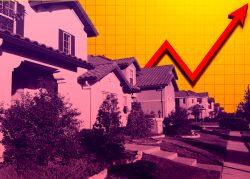Texas needs to build hundreds of thousands of new homes if it wants to keep up with demand and population growth.
The state leads the nation with the highest number of building permits for privately owned housing units since 2008, but the pace of new construction still lags behind the state’s rapid population growth, particularly in the major metropolitan areas, the Dallas Morning News first reported, citing the Texas Comptroller’s office.
Estimates show Texas needed an additional 306,000 homes as of last year to make any significant impact on demand, according to Up for Growth, a nonprofit organization that focuses on housing policy. A shortage of supply, particularly for those in lower income brackets, has led to rising prices and limited housing options.
“Texans continue to suffer from elevated prices and high interest rates that put significant upward pressures on the costs of borrowing and home ownership,” Texas Comptroller Glenn Hegar said. “Simply put, our state, which is generally well regarded for its low cost of living, is facing the pressures of a decline in housing affordability as our population and demand for housing continue to rise.”
The Dallas-Fort Worth metro area is among the hardest hit by this housing shortage.
The region, which led all U.S. metro areas in population growth from 2020 to 2023, has seen median home prices increase by more than 40 percent in recent years, according to Texas A&M University’s Texas Real Estate Research Center. In January 2020, the median price of a home in DFW was just over $267,000; today, that figure has soared past $400,000.
Even though it is a national leader in both apartment and single-family housing production, DFW still faces a deficit of almost 50,000 housing units.
The shortage is felt most acutely by the region’s poorest residents. The city of Dallas alone requires nearly 34,000 additional apartments to meet the needs of lower-income residents, according to the Dallas nonprofit Child Poverty Action Lab.
Hegar, a Republican who holds an elected position, stopped short of offering specific recommendations, but he pointed to local zoning laws and land-use regulations, as well as institutional investors as potential obstacles to affordable housing.
“Lawmakers have taken critical steps in recent years to lower the overall cost of homeownership by reducing the property tax burden on Texans, and we are making progress as a state toward lowering artificial barriers and removing regulations that limit or inhibit home building,” Hegar said. “But this issue remains daunting and key to our continued overall economic health.”
Read more



The report aligns with calls from state leaders, including Gov. Greg Abbott, to address corporate ownership of homes in upcoming legislative sessions. While some efforts to reduce property taxes have been made, more legislative action is needed to address housing affordability.
Given the importance of housing affordability to Texas’ economic health, Hegar says he is committed to working with legislators to develop solutions for next year’s legislative session.
— Andrew Terrell
